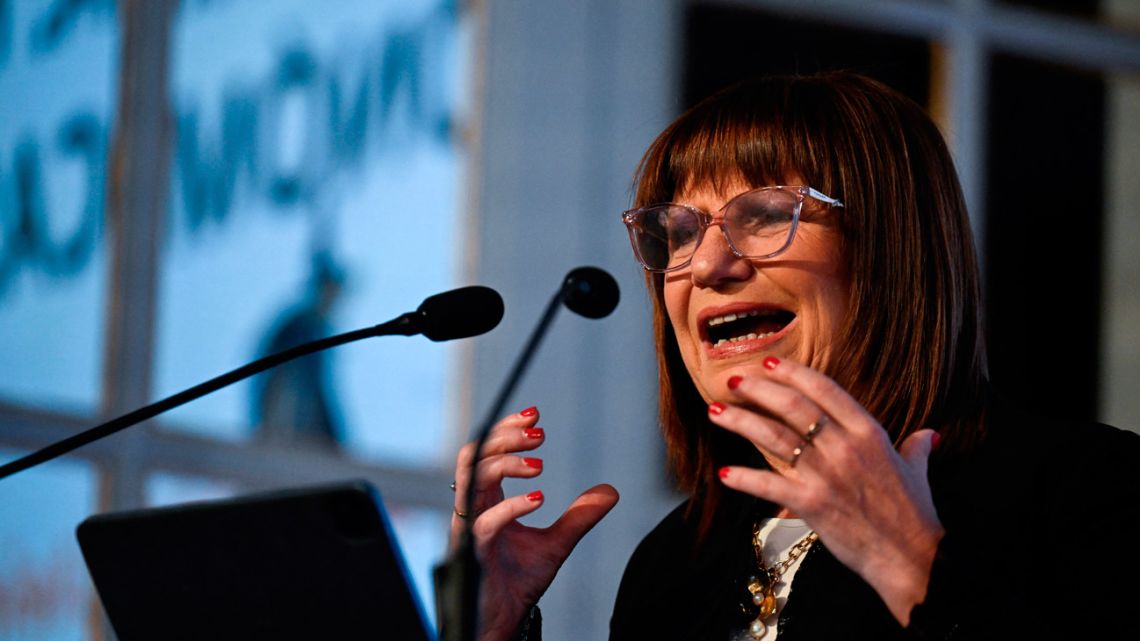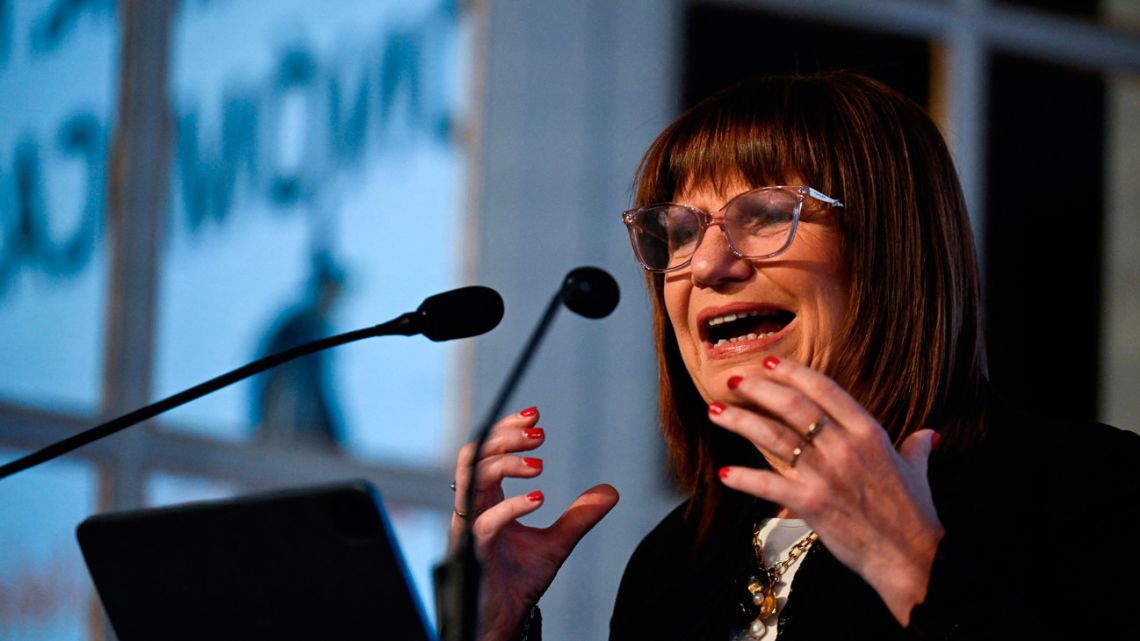Abdul Rehman Majeed
SENIOR MEMBER

- Joined
- Dec 25, 2019
- Messages
- 5,103
- Reaction score
- -40
- Country
- Location
After Saudi Arabia, Now Argentina is planning to not join BRICS
Presidential candidates Javier Milei and Patricia Bullrich indicate they would withdraw the approved application for BRICS membership, casting serious doubt over likelihood of nation joining group of emerging economies.
 PRESIDENTIAL CANDIDATE FOR THE JUNTOS POR EL CAMBIO COALITION, PATRICIA BULLRICH, SPEAKS DURING THE EVENT '2023 LATIN AMERICAN CITIES: CONFERENCES BUENOS AIRES' IN BUENOS AIRES ON AUGUST 24, 2023. | LUIS ROBAYO / AFP
PRESIDENTIAL CANDIDATE FOR THE JUNTOS POR EL CAMBIO COALITION, PATRICIA BULLRICH, SPEAKS DURING THE EVENT '2023 LATIN AMERICAN CITIES: CONFERENCES BUENOS AIRES' IN BUENOS AIRES ON AUGUST 24, 2023. | LUIS ROBAYO / AFP
Argentina hasn’t even formally joined the BRICS yet, but its membership is already in doubt.
The two main opposition presidential candidates in the upcoming October elections, libertarian leader Javier Milei and right-wing hopeful Patricia Bullrich, both declared on Thursday that they would not allow the country to join the bloc of emerging economies led by Brazil, Russia, India, China and South Africa.
The comments, which came just hours after President Alberto Fernández announced Argentina’s application had been approved, cast serious doubt over whether the country will even get to join the bloc at all.
Ascension is planned for January 1, 2024, by which time the general election will have taken place and a new head of state will have been sworn into office.
Addressing business leaders at an event in Buenos Aires, Bullrich said Thursday she would cancel the group's membership if she takes office on December 10.
Milei, who has already said he won’t trade with “communist” nations (a label he says applies to Brazil and China) said he doesn't want to deal with nations governed by the left in general.
"I'm not going to push for deals with communists because they don't respect the basic parameters of free trade, freedom and democracy, it's geopolitics," said Milei, the candidate for president of La Libertad Avanza who received the most votes of all candidates (30 percent) in a recent presidential primary election.
“Some countries are not along those lines,” he declared.
Bullrich was more forceful. President Fernández, she added, put the country “in a position of enormous weakness” for committing to entering the BRICS alongside Iran during the invasion of Ukraine.
"Argentina, under our government, will not be in the BRICS," said Bullrich, the presidential candidate for the main opposition Juntos por el Cambio coalition, which won 28 percent in the August 13 PASO through its two candidates.
Both presidential hopefuls spoke at a day of conferences organised by the US business organisation Council of Americas, which brought together political leaders from both the ruling and opposition parties in Buenos Aires.
BRICS leaders formally endorsed the enlargement of the bloc on Wednesday at a summit in Johannesburg, South Africa. As well as Argentina, applications from Egypt, Ethiopia, Saudi Arabia, Iran and the United Arab Emirates were also approved.
Milei, who during the conference once again pitched his proposal to dollarise the nation’s economy, did say that if he came to power, he would allow private businesses to do business in the BRICS countries.
"I'm not going to get involved in that, it's the free market," he said.
Bullrich argued that her rejection of the BRICS group was based on Russia's invasion of Ukraine and the fact that Iran is among the new members, linked the country to the 1994 terrorist bombing of the AMIA Jewish community centre in Buenos Aires, which left 85 people dead.
Peronist President Alberto Fernández, who has not opted to seek re-election, later responded to Bullrich’s remarks in a radio interview. "You don't understand what you are saying, foreign policy has no ideologies," he told Radio Perfil.
Questions about Argentina’s long-term commitment to the BRICS underscore the challenges Brazil’s President Luiz Iáacio Lula da Silva faces to have more Latin American representation in the group. Argentina’s inclusion follows a request made last year by Fernández, a close ally of the Brazilian leader.
Speaking from Johannesburg, Lula said Brazil would negotiate with Argentina’s new president, regardless of who wins the October 22 election.
“It could be that the president will not want to negotiate with Brazil, and that is his sovereign right,” he said. “The relationship with Argentina is very important for Brazil and South America.”
– TIMES/AFP/BLOOMBERG

 www.batimes.com.ar
www.batimes.com.ar
Argentina’s BRICS membership in doubt as opposition rejects move
Presidential candidates Javier Milei and Patricia Bullrich indicate they would withdraw the approved application for BRICS membership, casting serious doubt over likelihood of nation joining group of emerging economies.

Argentina hasn’t even formally joined the BRICS yet, but its membership is already in doubt.
The two main opposition presidential candidates in the upcoming October elections, libertarian leader Javier Milei and right-wing hopeful Patricia Bullrich, both declared on Thursday that they would not allow the country to join the bloc of emerging economies led by Brazil, Russia, India, China and South Africa.
The comments, which came just hours after President Alberto Fernández announced Argentina’s application had been approved, cast serious doubt over whether the country will even get to join the bloc at all.
Ascension is planned for January 1, 2024, by which time the general election will have taken place and a new head of state will have been sworn into office.
Addressing business leaders at an event in Buenos Aires, Bullrich said Thursday she would cancel the group's membership if she takes office on December 10.
Milei, who has already said he won’t trade with “communist” nations (a label he says applies to Brazil and China) said he doesn't want to deal with nations governed by the left in general.
"I'm not going to push for deals with communists because they don't respect the basic parameters of free trade, freedom and democracy, it's geopolitics," said Milei, the candidate for president of La Libertad Avanza who received the most votes of all candidates (30 percent) in a recent presidential primary election.
“Some countries are not along those lines,” he declared.
Bullrich was more forceful. President Fernández, she added, put the country “in a position of enormous weakness” for committing to entering the BRICS alongside Iran during the invasion of Ukraine.
"Argentina, under our government, will not be in the BRICS," said Bullrich, the presidential candidate for the main opposition Juntos por el Cambio coalition, which won 28 percent in the August 13 PASO through its two candidates.
Both presidential hopefuls spoke at a day of conferences organised by the US business organisation Council of Americas, which brought together political leaders from both the ruling and opposition parties in Buenos Aires.
BRICS leaders formally endorsed the enlargement of the bloc on Wednesday at a summit in Johannesburg, South Africa. As well as Argentina, applications from Egypt, Ethiopia, Saudi Arabia, Iran and the United Arab Emirates were also approved.
Milei, who during the conference once again pitched his proposal to dollarise the nation’s economy, did say that if he came to power, he would allow private businesses to do business in the BRICS countries.
"I'm not going to get involved in that, it's the free market," he said.
Bullrich argued that her rejection of the BRICS group was based on Russia's invasion of Ukraine and the fact that Iran is among the new members, linked the country to the 1994 terrorist bombing of the AMIA Jewish community centre in Buenos Aires, which left 85 people dead.
Peronist President Alberto Fernández, who has not opted to seek re-election, later responded to Bullrich’s remarks in a radio interview. "You don't understand what you are saying, foreign policy has no ideologies," he told Radio Perfil.
Questions about Argentina’s long-term commitment to the BRICS underscore the challenges Brazil’s President Luiz Iáacio Lula da Silva faces to have more Latin American representation in the group. Argentina’s inclusion follows a request made last year by Fernández, a close ally of the Brazilian leader.
Speaking from Johannesburg, Lula said Brazil would negotiate with Argentina’s new president, regardless of who wins the October 22 election.
“It could be that the president will not want to negotiate with Brazil, and that is his sovereign right,” he said. “The relationship with Argentina is very important for Brazil and South America.”
– TIMES/AFP/BLOOMBERG

BRICS membership in doubt as opposition rejects move
Presidential candidates Javier Milei and Patricia Bullrich indicate they would withdraw the approved application for BRICS membership, casting serious doubt over likelihood of nation joining group of emerging economies.




